The Intel Core i7-8086K Review
by Ian Cutress on June 11, 2018 8:00 AM EST- Posted in
- CPUs
- Intel
- Core i7
- Anniversary
- Coffee Lake
- i7-8086K
- 5 GHz
- 8086K
- 5.0 GHz
Benchmarking Performance: CPU Rendering Tests
Rendering tests are a long-time favorite of reviewers and benchmarkers, as the code used by rendering packages is usually highly optimized to squeeze every little bit of performance out. Sometimes rendering programs end up being heavily memory dependent as well - when you have that many threads flying about with a ton of data, having low latency memory can be key to everything. Here we take a few of the usual rendering packages under Windows 10, as well as a few new interesting benchmarks.
All of our benchmark results can also be found in our benchmark engine, Bench.
Corona 1.3: link
Corona is a standalone package designed to assist software like 3ds Max and Maya with photorealism via ray tracing. It's simple - shoot rays, get pixels. OK, it's more complicated than that, but the benchmark renders a fixed scene six times and offers results in terms of time and rays per second. The official benchmark tables list user submitted results in terms of time, however I feel rays per second is a better metric (in general, scores where higher is better seem to be easier to explain anyway). Corona likes to pile on the threads, so the results end up being very staggered based on thread count.
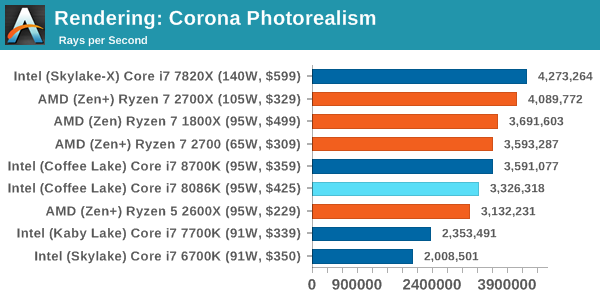
Corona is a fully multi-threaded test, so it is surprising to see the 8086K lag behind the 8700K here. This is likely a scenario where the fact that our borrowed testbed setup doesn't perfectly match our standard testbed is playing a factor.
Blender 2.78: link
For a render that has been around for what seems like ages, Blender is still a highly popular tool. We managed to wrap up a standard workload into the February 5 nightly build of Blender and measure the time it takes to render the first frame of the scene. Being one of the bigger open source tools out there, it means both AMD and Intel work actively to help improve the codebase, for better or for worse on their own/each other's microarchitecture.
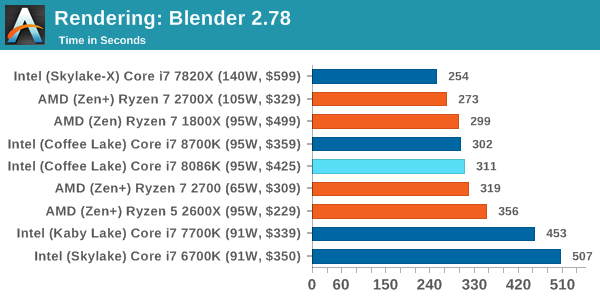
Blender also likes to load up the threads, and the 8086K is behind again.
LuxMark v3.1: Link
As a synthetic, LuxMark might come across as somewhat arbitrary as a renderer, given that it's mainly used to test GPUs, but it does offer both an OpenCL and a standard C++ mode. In this instance, aside from seeing the comparison in each coding mode for cores and IPC, we also get to see the difference in performance moving from a C++ based code-stack to an OpenCL one with a CPU as the main host.
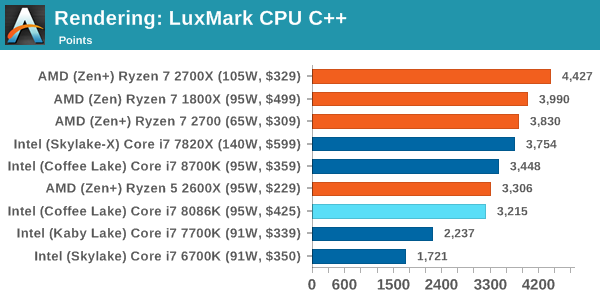
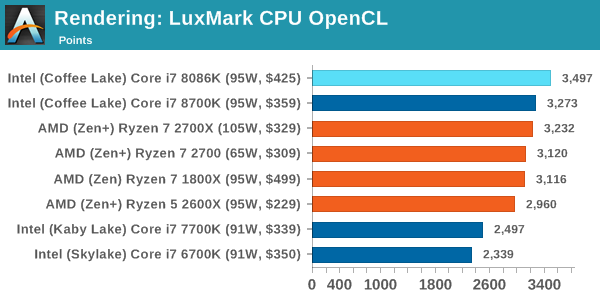
POV-Ray 3.7.1b4
Another regular benchmark in most suites, POV-Ray is another ray-tracer but has been around for many years. It just so happens that during the run up to AMD's Ryzen launch, the code base started to get active again with developers making changes to the code and pushing out updates. Our version and benchmarking started just before that was happening, but given time we will see where the POV-Ray code ends up and adjust in due course.
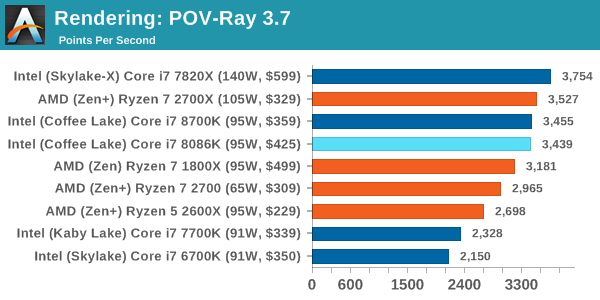
Virtually identical scores between the 8086K and 8700K in POV-Ray.
Cinebench R15: link
The latest version of CineBench has also become one of those 'used everywhere' benchmarks, particularly as an indicator of single thread performance. High IPC and high frequency gives performance in ST, whereas having good scaling and many cores is where the MT test wins out.
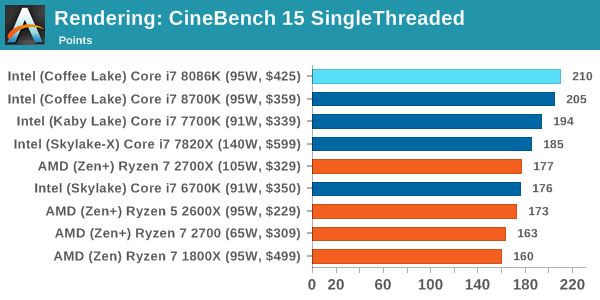
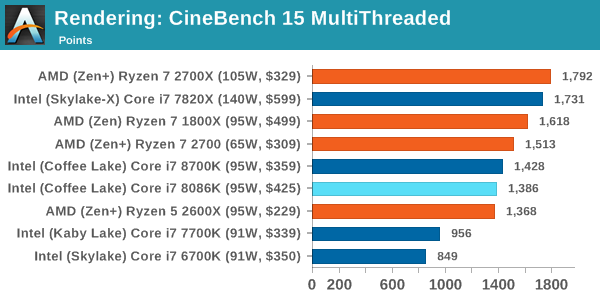
The 8086K gets a new fastest single core score in CineBench R15 ST, but falls slightly behind the 8700K in MT.










111 Comments
View All Comments
mkaibear - Tuesday, June 12, 2018 - link
"Total flop"I suggest benchmarking the CPU in your phone against this CPU and try again.
SanX - Tuesday, June 12, 2018 - link
They mostly serve different purposes and apps and have different TDP. But if you restrict consumption power of Intel processors to the same one of mobile processors then in the same apps it's not clear in advance which one will win.Time for ARM to look at the server and supercomputers markets.
iranterres - Monday, June 11, 2018 - link
HAHA. Intel once again trying to fool some people and appeasing the fanboys with something worthless and expensive.xchaotic - Tuesday, June 12, 2018 - link
So are the regular i7-8600K unable to run all core 5GHz? If so, what't the max stable freq for a non-binned i7-8600K? Personally I went for an even lower/cheaper i5-8400 CPU, but I see why some people prefer to be running max speed all the time...Rudde - Tuesday, June 12, 2018 - link
I assume you mean the i7-8700k.There is a phenomenon called 'the silicon lottery.' Basically, when you buy an i7-8700k, you can't know the max stable frequency. It could max out at 5.2GHz or it could only reach 4.7GHz before going unstable. The thing is, you can't know what you'll end up with.
This brings us to the i7-8068k. The i7-8068k is pretty much guaranteed to have a max stable frequency above 5GHz. Of course, this matters only when overclocking.
Bradyb00 - Tuesday, June 12, 2018 - link
Is it a lower temp than a 8700k for a given multiplier though? i.e. both 8700k and 8086k at 46x which is cooler? 8700k obviously has to be averaged as not everyone is lucky with the silicon lottery.Presumption is the 8086k will run cooler on average due to the better binning.
In which case I'm happy to pay more to save some degrees in my wee itx build
Lolimaster - Tuesday, June 12, 2018 - link
Why not simply pick the Ryzen 5 2600, same thing with actual lower temps from using high quality solder...$189
TheinsanegamerN - Monday, June 18, 2018 - link
Depends on the use case. For pure gaming, I'd stick with intel, which is a bit faster now and, if history is any indication, will hold up a LOT better for gaming in 5 years then the AMD chip will.Especially if you run games or emulators dependent on IPC (like PCSX2) the intel chip will perform a lot better then the AMD chip.
There is also the memory controller. Ryzen 2000 improved, but intel's controller is still superior, and that matters for things like RTS games that consume memory bandwidth like black holes consume stars.
Stuka87 - Tuesday, June 12, 2018 - link
Props to Asrock for providing the system so that you could get us stuff so quickly Ian. Not sure why everybody is complaining about the system and cooling that was used. The system was loaned to you so that you could get us numbers fast, which personally I am happy about. Thanks for your hard work Ian!El Sama - Tuesday, June 12, 2018 - link
This is quite the premium cost for a small increase in frequency that should be close to what you get to a 8700k OCed, an interesting offering regardless.